☀️Heat in July: how to find a room with real air conditioning
It's a summer evening, the embankments are full of people, the sunset is reflected in the windows — and only you know that the night will be long: an attic room, a south-west facing window, the ‘climate control’ turned out to be a fan, and the description discreetly mentioned air cooling. July in Copenhagen can be wonderful — if you make sure in advance that you have real A/C, not just a nice word on the card.
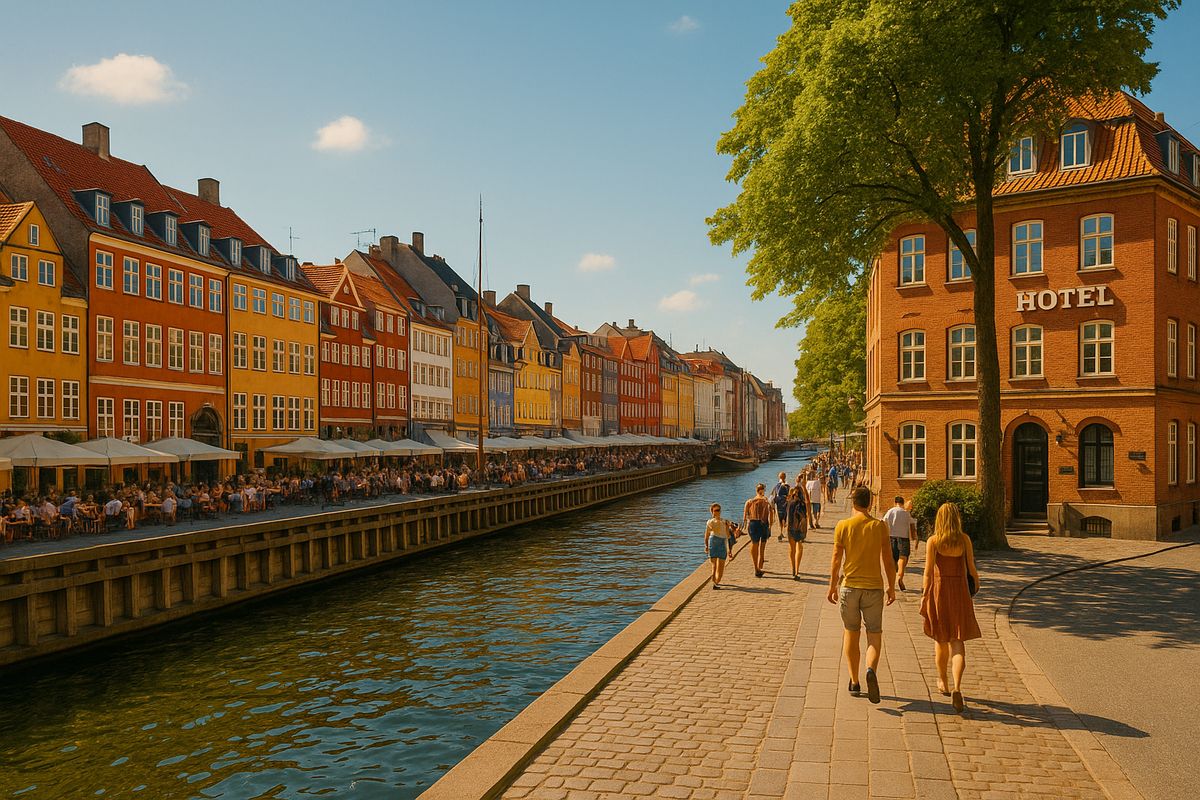
🌡️ Why air conditioning in Denmark is not ‘standard’
Historically, summers here are mild, and for decades hotels have relied on natural ventilation: thick walls, windows on two sides, brick grilles on the roofs, cool courtyards. The mass installation of split systems began much later than in southern Europe. Many buildings are architectural monuments: it is difficult to lay pipes, and energy efficiency and noise standards are stricter than in the holiday destinations of the south. That is why there are still hotels where ‘cooling’ means ventilation without cooling, ‘Danish air conditioning’ (= window + fan), and sometimes district cooling in common areas without individual thermostats in the rooms. Hence the classic July reviews: ‘didn't sleep a wink, it was boiling hot under the roof’, ‘next time — only with A/C’.
📅 When A/C is especially important
- Late June to mid-August. Long days, the sun is high, brick and tiled attics heat up.
- Festival weeks (Distortion in early June, Pride in mid-August): the city is full, ‘rooms with A/C’ are the first to go, prices rise.
- South and west facades, top floors. Rooms overheat in the sun even at moderate air temperatures.
- View of roofs/canals without shade. Beautiful, but warmer; rooms above restaurants and kitchens are additionally heated.
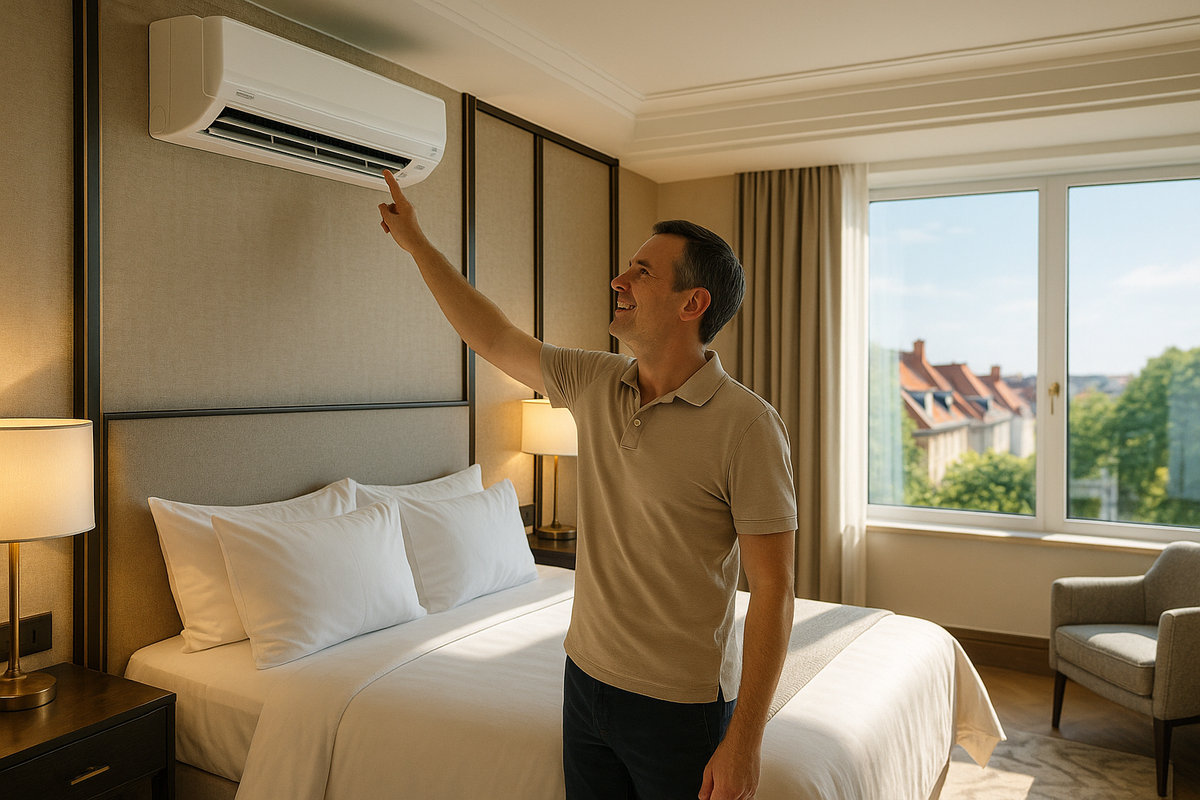
✅ Checklist ‘how to catch real A/C before paying’
- The ‘Air conditioning’ filter is on — it sounds trivial, but what is written next is important.
- The room card should say ‘Air conditioning in room’/‘A/C’ specifically in the list of room amenities, not ‘in the hotel’ or ‘in public areas’.
- Suspicious wording: air cooling, climate control, fresh-air system, ventilation, temperature control — these often do not include compressor cooling.
- Photo of thermostat/grilles: look for a wall-mounted thermostat with degrees and ceiling/wall diffusers (not just a window and fan).
- Write one short sentence to the hotel: ‘I need confirmation of A/C in room, individually controlled, not just in common areas. Please confirm.’
- The room category matters. Sometimes A/C is only available in ‘premium/executive’ rooms, while ‘standard’ rooms are cooled by air vents.
- Avoid attics/south-west facing rooms in old buildings: ask for a lower or middle floor, windows facing the courtyard/north, blackout curtains.
- Flexible cancellation for July is almost always justified: keep the option to change your accommodation if a heatwave coincides with your dates.
- Double booking as a backup: keep a second option with A/C on a refundable rate, and cancel the better one a week before your trip.
- If you are staying in a hostel, check: A/C in dorms is not available everywhere. In large rooms without air conditioning, it is stuffy at night even with the windows open.
🧊 What is district cooling (and why it is not always your A/C)
District cooling is a centralised system that supplies a building with a coolant (essentially a ‘city chiller’). Pros: more environmentally friendly than split systems, quiet for the street. Cons: not the same as individual air conditioning in each room. In some hotels, rooms are also connected to the network (controlled by a thermostat), in others — only lobbies/restaurants/conference rooms, and the rooms remain ventilated without cooling. How to find out in advance: ask specifically for ‘individually controlled A/C in guestroom’. If they say ‘we have district cooling’, ask them to clarify whether your room category has a room circuit and a personal thermostat.
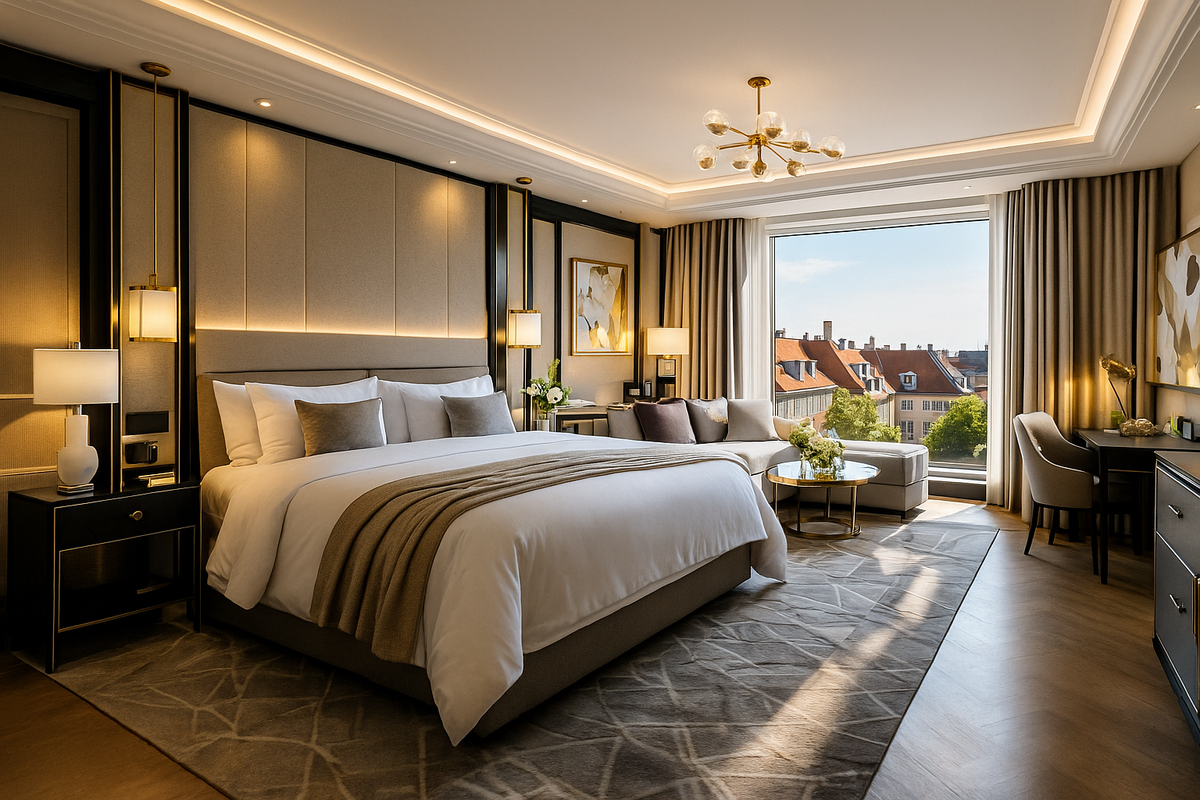
🧭 Where to stay in the heat if there is no A/C or there are few options left
- Areas near the water (Nordhavn, Islands Brygge): the evening breeze helps, but it doesn't save you from the stuffiness of the attic.
- Østerbro, Frederiksberg: fewer ‘stone bags’, more greenery and shade, good M3/M4 connections to the centre.
- Courtyard instead of a ‘postcard’ view: lower temperatures, less noise from nightlife — sleep with the window open.
- Stone and ceiling height. Houses with thick walls and no attic break keep cooler better.
- Room plan B: sometimes hotels agree to change the category/side of the facade on the spot — write in advance, arrive early.
🧰 Plan B in case of heat (if there is no air conditioning)
- Fan in the room (ask at the reception desk immediately; sometimes they are given out for free/for a deposit).
- Cotton linen + thin blanket: ask for a light set, remove the thick duvet.
- Blackout curtains closed during the day, airing at night/in the morning — a classic ‘Scandi’ approach.
- Cool shower before bed and a bottle of water by the bed.
- Quiet side: window facing an alley/courtyard — you can sleep with the window slightly open without street noise.
- Daytime ‘cool break’: museums/galleries/shopping centres during peak sun hours, walks — in the morning and closer to sunset.
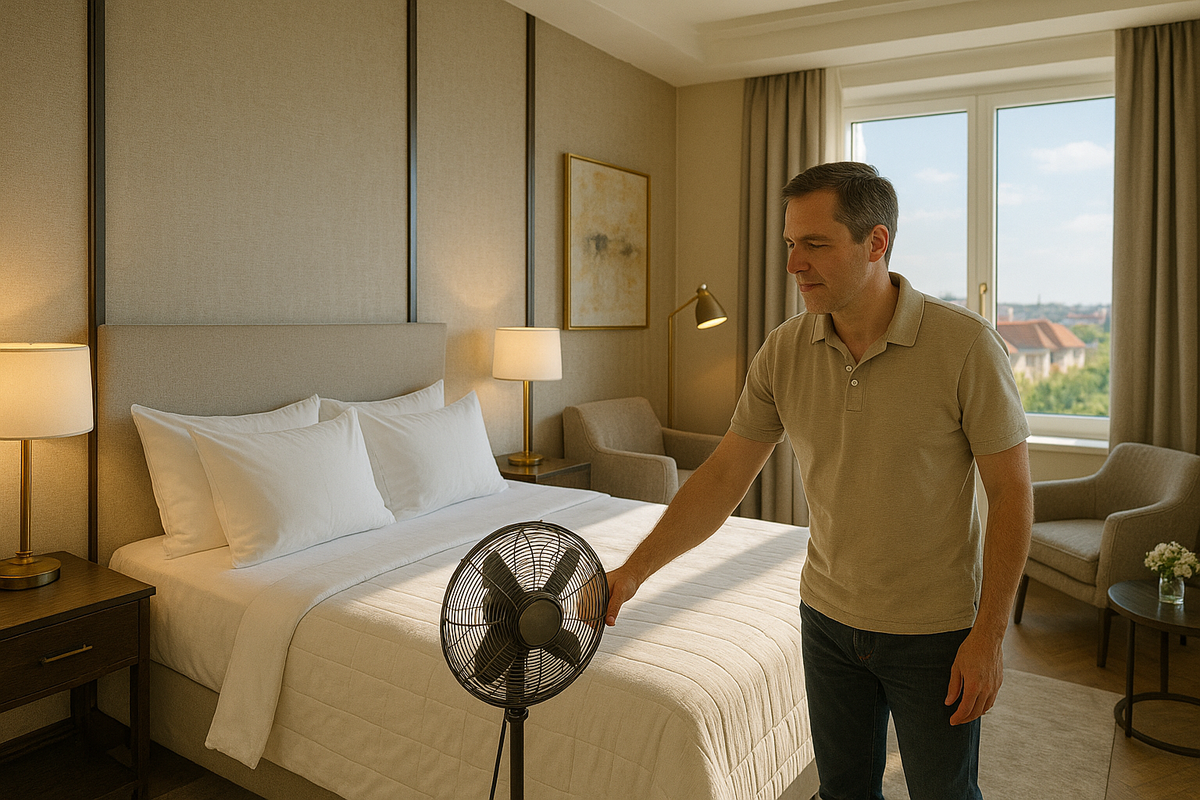
🧳 Hostels and July: separate logic
In large dorms, the heat from people + kitchen/common areas quickly raise the temperature. Check:
- A/C specifically in the dorm, not ‘in the lobby’.
- Maximum number of beds in the room (8-12 beds are hotter than 4-6 beds).
- Ceiling fans/sockets and lockers (so you don't have to close the window because of draughts).
- Women's/family rooms often have a better microclimate and less feedback about ‘stifling nights’.
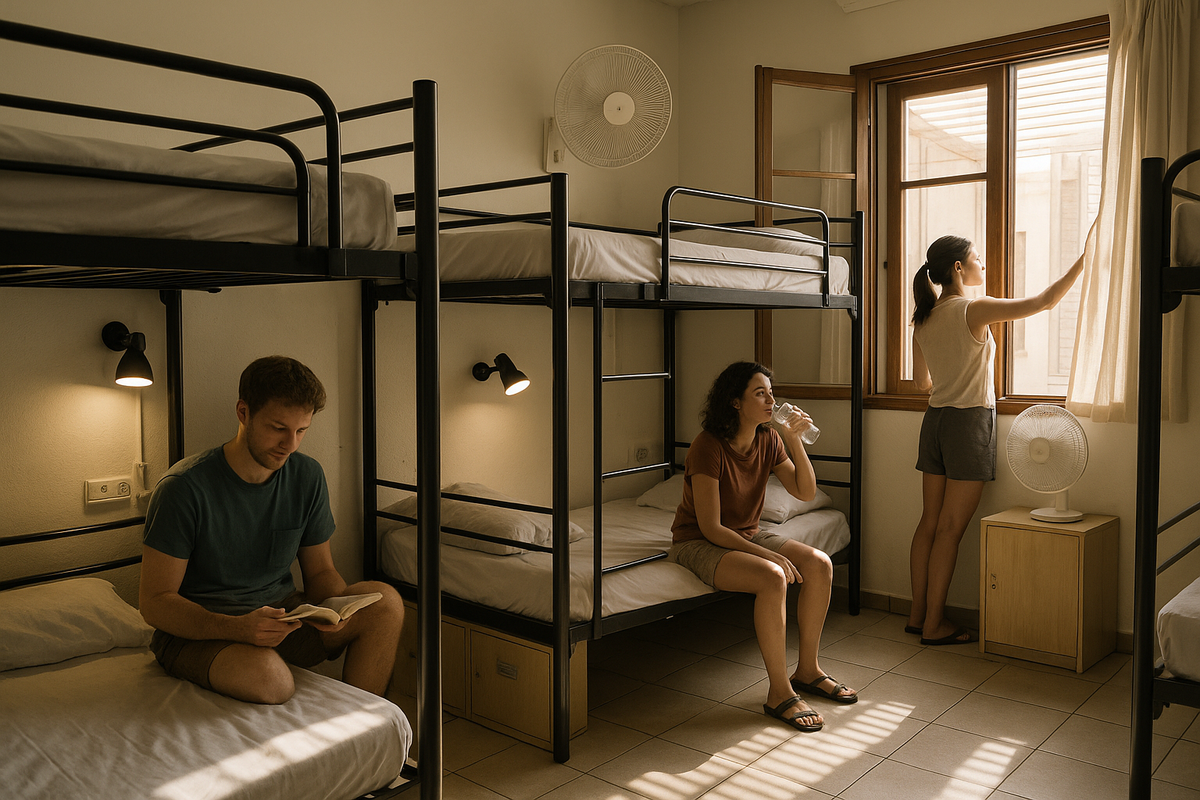
🧒 Families and sensitive guests
- Children often find stuffy nights harder to bear: if you are travelling in July with young children, A/C is best considered essential.
- Allergies/asthma: air conditioning with normal filtration and closed windows at night is sometimes more comfortable than dust/fluff from the street.
- Noise: air conditioning reduces the need to keep windows open in busy neighbourhoods — a good night's sleep is worth more than a couple of hundred crowns.
💬 Live quotes from reviews (summarised)
- ‘In July, it was impossible to sleep without proper air conditioning. Next time, I'll pay extra for a room with a thermostat — even if it doesn't have a view.’ .
- ‘Air cooling turned out to be just ventilation, so we had to get a fan at the reception and sleep with earplugs because of the open window.’
- ‘We moved to the “quiet side” — the north facade and courtyard saved us. We kept the curtains closed during the day and walked by the water in the evening.’
🧾 Mini-reminder before booking (save)
- Look for: ‘Air conditioning in room’, photo of the thermostat, mention of individual control.
- Be careful with: air cooling, climate control, ventilation, fresh air.
- Request: lower floor, north/courtyard, blackout, fan in the room.
- Planning: flexible cancellation, second backup booking, early check-in.
On site: immediately check the A/C (set to 20–22°C, wait for the system to respond), if there is a problem — change rooms.
❓ FAQ
Look at which section mentions A/C. It should be listed under room amenities, not ‘hotel amenities’. The words air cooling / ventilation / climate control without any mention of a compressor are a red flag. A photo of a thermostat in the room is a good sign. If in doubt, ask: ‘Is there individually controlled air conditioning in this room type?’.
It's good for the environment and the quietness of the city, but it's important for guests to have a circuit in their room. If only the lobby and conference areas are cooled, you won't feel it. Ask directly: ‘Are rooms in my category connected to the cooling system and do they have a personal thermostat?’.
In historic buildings and attics, it is more difficult to install ducts and ensure noise and energy standards, so air conditioning is less common there. In the budget segment, sometimes only ventilation is installed. New hotels and international business brands are more likely to have central cooling or full-fledged fan coils.
The breeze helps, but it does not replace air conditioning during hot weeks. Plus, an open window means street noise. If you are sensitive to sleep, choose A/C + a quiet side, and leave the water view for daytime walks.
For a couple of moderately warm nights — yes, but in sustained heat, a fan only stirs up warm air. At the very least, ask for a fan, light bedding and a room facing the courtyard; if a heatwave is forecast, it is better to change hotels to one with A/C.
If you are travelling in July-August and are sensitive to sleep, then yes. The extra cost is offset by the quality of your holiday: you are spending money on experiences anyway, and without sleep, there will be fewer of them. Check that the A/C is in this category, not just in ‘premium’.
Book in advance, choose a flexible rate, and check the forecast 7–10 days before departure: if hot weather is forecast, stick with a hotel with confirmed A/C; if it's going to be cooler, you can save money and change your accommodation. During festival weeks, it's better to have two options and choose closer to the date.





0 comments
Log in to leave a comment